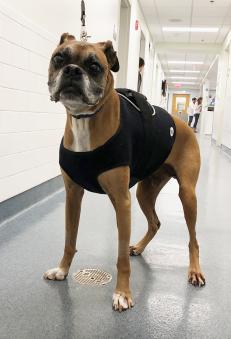Fainting
Fainting—also called syncope—is a sudden, momentary loss of consciousness with natural recovery. Fainting is common in dogs with heart disease but can be caused by many other illnesses. Fainting is less common in cats.
When fainting is caused by heart disease, it is often due to an abnormal heart rhythm (arrhythmia). This can be a very slow, very fast or irregular heartbeat. During these abnormal rhythms the heart does not pump enough blood to the brain. This lack of blood causes the animal to faint.
Fainting can look like a seizure, but it is important to differentiate these two events as treatment is very different. In both fainting and seizure, animals will lose consciousness, collapse on their side, and they may urinate or defecate. A fainting episode is more likely to occur after exercise or coughing. It usually lasts only a short time (often 30 seconds or less), and the animal recovers quickly (usually within 30 seconds to 2 minutes).
Seizures are less likely to be triggered by excitement or exertion. They are more likely to have chaotic limb motion, excessive salivation or jaw chomping movements. Seizures often last for 1 or 2 minutes or longer, and usually have a longer recovery period. The pet may seem disoriented for some time after the event.
To help your veterinarian determine whether your pet experienced a seizure or fainted, a specific description or video of the event is very helpful. Try to answer these questions:
- Was your pet exercising or coughing prior to the event?
- How long did the event last?
- Was your pet drooling excessively or was there facial chomping during the event?
- How long did it take for your pet to return to their normal behavior and attitude?
A true fainting event may occur once, or they can occur quite frequently. Because fainting can be a sign of very serious heart disease, your veterinarian will need to perform tests that evaluate heart condition. One such test is a 24-hour Holter monitor that records the heart’s activity for a full day.

